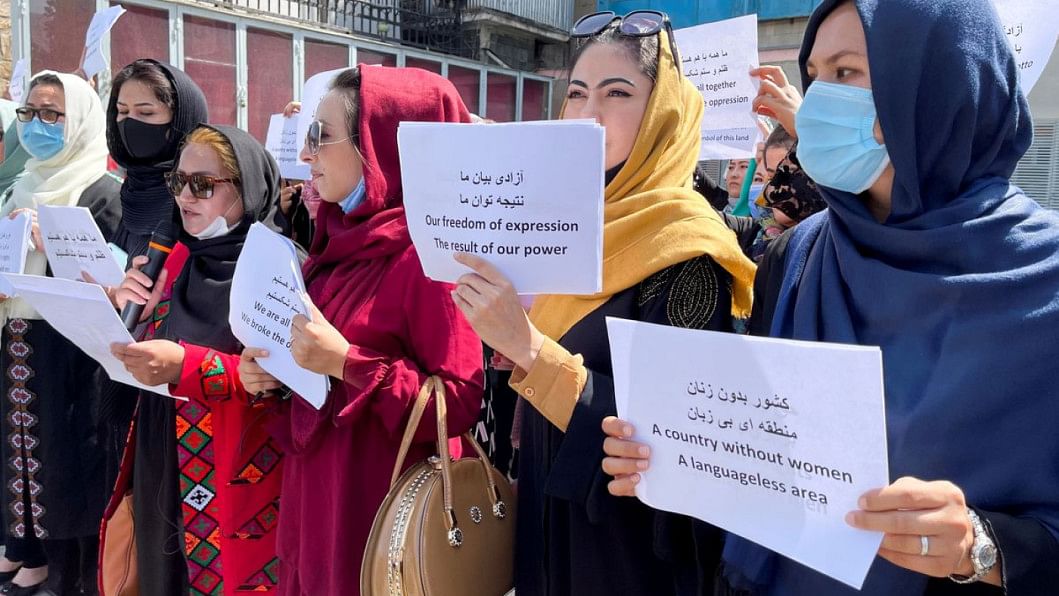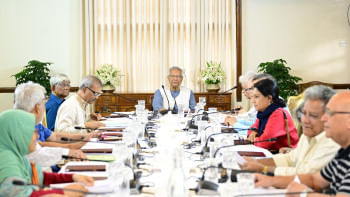A first-hand account of how Afghan women are faring

When asked to summarise my story as an Afghan woman affected by Taliban rule, I carefully considered how to effectively convey the harsh realities of my situation and the challenges I still face. I hope to make it easily understandable for anyone who reads my story and that of other Afghan women. However, it is important to acknowledge that the true extent of human suffering is often difficult to comprehend. Nevertheless, I will strive to articulate it.
I come from a conservative and religious family that has always believed that a good woman should wear a hijab in public spaces and never say "no" to her family. They also hold the belief that women should always obey their family or guardian without any question. Despite their restrictions, I fought for my right to an education and managed to attend university by making sacrifices and by agreeing to an arranged marriage. However, after two years of being engaged, my fiance informed me that my role would be to stay at home and take care of our future children and his family. This news devastated me, and I made the difficult decision to call off the engagement. Unfortunately, my family pressured me not to do so, and I reached a point of desperation wherein I attempted suicide. Thankfully, my life was saved, and my father was the only one who supported me in ending the engagement, stating firmly that it was over.
After asking my father for permission, I was able to join university. However, my plans were disrupted by the Covid-19 pandemic, which caused a delay in my sitting for the Kankor exam (a university entry exam in Afghanistan) and wasted approximately two years of my life. When the Taliban regained power, my access to education was restricted again. Despite this, I refused to remain silent and actively participated in anti-Taliban protests, continuing my struggle for freedom. Unfortunately, due to the Taliban attack on our home, we were forced to flee the country and become refugees in Pakistan. Now, as refugees, we face new and challenging situations as we try to rebuild our lives.
Firstly, and most importantly, I have encountered xenophobic and nationalistic comments that have deeply insulted me. While speaking in English, I have heard comments on three separate occasions along the lines of, "How can an Afghani speak English?"
It should be noted that the issue at hand is not specifically about extremism, extreme Islam, radical Islam, or moderate Islam; rather, it pertains to political Islam. Some individuals have propagated the idea that Afghanistan's problem is solely rooted in extremism, but this is not accurate.
I applied for a study visa to continue my education, but they instructed us to go to the border after receiving the visa even though they are well aware that the Taliban does not allow women to leave the country without their Mahram or guardian, such as their father, spouse, brother, or son. This has become a major concern for me and for many Afghan women. Through this platform, I sincerely request the Pakistan government to remove this anti-women policy and extend a helping hand to Afghan women.
Lastly, Afghan women activists and defenders are not permitted to lead protests or raise their voices against the Taliban's terrorist and anti-women regime.
Despite these difficulties, I remain committed to working with women's grassroots movements, publications, and organisations to raise awareness among Afghan and Iranian women.
The United Nations, the European Union, western states, and mainstream media often portray the Taliban as the sole problem facing Afghanistan and Afghan women. However, they are not the entirety or core of our problem. The Taliban is just one aspect of our challenges, as they were created by the West, Nato, and their allies in Asia.
It is the West that continues to provide financial support to the Taliban, sending millions of dollars their way. It is also the West that remains silent in the face of the Taliban's genocidal and gender-based crimes. They have not taken practical steps to stop this terrorist regime. They seem content with merely condemning and reporting on the crimes committed by the Taliban, without actively working towards a solution.
It should be noted that the issue at hand is not specifically about extremism, extreme Islam, radical Islam, or moderate Islam; rather, it pertains to political Islam. Some individuals have propagated the idea that Afghanistan's problem is solely rooted in extremism, but this is not accurate.
One crucial aspect of a secure and democratic society is secularism, which ensures the separation of politics and governance from religion. However, those in power may choose to overlook this principle as it serves their interests. They are unlikely to address this issue because they rely on political Islam to lead their campaigns in the Middle East and in other Muslim countries. The main problems in Afghanistan are imperialism, the US, and Nato. If these imperialist forces had indeed stopped creating and supporting terrorists, why would we still be facing terrorism today?
However, it is even more crucial to recognise that mainstream media's narrative of Afghan women's situation under Taliban rule is largely shaped by the policies of states that provide financial support to the media.
The situation of Afghan women should be heard from themselves and in their own words.
The Taliban's treatment of women in Afghanistan is indeed characterised by severe human rights abuses, including gender-based violence, restrictions on women's freedom, and suppression of women's participation in public life. They have implemented policies that erase and eliminate women from various aspects of society and have been known to target and arrest women activists and defenders.
Furthermore, the Taliban's actions have contributed to a rise in child marriages and forced marriages, which further perpetuate gender inequality and violate the rights of women and girls. There have also been reports of the Taliban engaging in brutal acts of violence against women, including beheadings and drownings.
It is crucial to condemn these human rights abuses and work towards promoting gender equality, protecting women's rights, and ensuring justice for the victims. Efforts should be made to hold perpetrators accountable, provide support and protection to women at risk, and create an inclusive and safe society for all individuals in Afghanistan.
Saiema Sultani is a feminist writer and a member of 8 March Women's Organisation (Iran-Afghanistan).
Views expressed in this article are the author's own.
Follow The Daily Star Opinion on Facebook for the latest opinions, commentaries and analyses by experts and professionals. To contribute your article or letter to The Daily Star Opinion, see our guidelines for submission.

 For all latest news, follow The Daily Star's Google News channel.
For all latest news, follow The Daily Star's Google News channel. 





Comments